A Scholarly Conference on Holodomor [Great Famine] was held in Rome
Monday, 25 November 2013, 16:19 An International Conference, “Holodomor -- the 80th Anniversary of the Ukrainian Genocide,” organized by the Christian Association of Ukrainians in Italy in cooperation with Rome City Council, was held on November 21, 2013 at Carroccio Hall in Rome City Hall. The conference was opened by Ukraine’s Ambassador to Italy Yevhen Perelyhin, who presented a historical summary about the Holodomor and informed the public about the Presidential Order on Commemorating the Memory of the Victims of the Holodomor in 2013.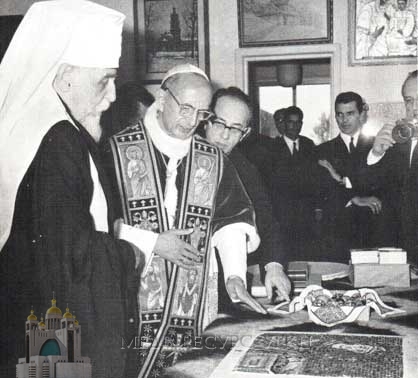
-
See also:
- Three hundred children and mothers who fled Ukraine because of the war began the school year with a prayer in St. Peter’s Cathedral in Vatican
- Ukraine. Gallagher: We need to keep the hope of dialogue alive
- Russia’s war crimes are Ukraine’s genocide, says UGCC Head at Milan Conference
Bishop Dionisii (Liakhovych), Apostolic Visitator for Ukrainians in Italy and Spain passed on the greeting to the conference members from His Beatitude Sviatoslav (Shevchuk), UGCC Head, and noted that “in remembering those perished during Holodomor, we do not seek revenge but justice and memory so that a similar tragedy does not occur in the future.” Professor Giovanna Brogi, President of Italian Association of Ukrainian Studies, delivered the welcoming address.
Professor Alberto Basciani, Eastern European University of Rome Tre, described the testimonies of the Holodomor eyewitnesses, citing archival documents of various governmental organizations in Rumania. He especially underlined the attempts made by the soviet authorities not to permit Ukrainian migrants in search of bread to enter Rumania.
Professor Giulia Lama, University of Milan, focused her presentation of Raphael Lemkin, the establisher of the legal term “genocide” and on his recognition of Holodomor as genocide in Ukraine of Ukrainians..
Rev. Dr. Athanasius McVay from Canada, who researched Holodomor in the Vatican Archives described the attempts by the Catholic Church of that time to organize assistance for Ukraine.
Professor Simone Bellezza, University of Trento, dealt in his presentation on the evolution over time of memorials to Holodomor in Ukraine.
The presentation by Ukrainian historian Volodymyr Viatrovych stirred great interest among the Italian public. He described and analyzed the attempts of the soviet counter-propaganda and the actions of KGB which were directed at not permitting the truth to be known about the Holodomor.
Tetyana Kuzyk, an additional counselor, greeted the audience from the City Council.
In conclusion Oleksandr Horodetsky familiarized the gathered about the letters of the Italian consuls in Ukraine. He received these documents from Rev. Porfyriy Pidruchnyi, who found them in the archives of the Italian MFA in the seventies of the last century.
A presentation of the film, made in Vicenza, “Holodomor – an unacknowledged memory” was shown.
In Palazzo Valentini on Thursday at 4 PM, an exhibit “Destroyed by Famine: the unknown genocide of Ukrainians” was opened. It was prepared by Ukraine-3000, a charitable fund, as part of the series “Lessons of History” (curator Olesia Stasiuk). In Rome the exhibit’s presentation was organized by the Christian Association of Ukrainians in Italy and the Ukrainian Embassy in Italy.
Christian Association of Ukrainians in Italy, Press Service
Photos by Volodymyra Borovyk

We can imagine what the prayer of the prisoners in the Russian torture centers in the Ukrainian Kharkiv region was like – Head of the UGCC on the 206th day of the war 17 September
A vast cemetery, a mass burial, was found near the city of Izyum, in which more than 400 innocently killed and tortured people have already been...
-
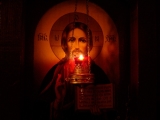 Глава УГКЦ у 158-й день війни: «Нехай Господь прийме з уст нашої Церкви псалми та моління за всіх тих, які особливо просять нашої молитви»
Глава УГКЦ у 158-й день війни: «Нехай Господь прийме з уст нашої Церкви псалми та моління за всіх тих, які особливо просять нашої молитви»
-
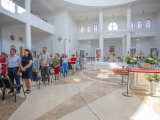 «Сила, яка походить із вірності Христові, є стержнем, який ніхто не може зламати», – Блаженніший Святослав
«Сила, яка походить із вірності Христові, є стержнем, який ніхто не може зламати», – Блаженніший Святослав
-
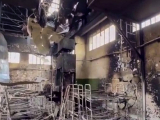 Глава УГКЦ у 157-й день війни: «В ім’я Боже ми засуджуємо звірства в Оленівці і світ повинен це засудити як особливий вияв дикості й жорстокості»
Глава УГКЦ у 157-й день війни: «В ім’я Боже ми засуджуємо звірства в Оленівці і світ повинен це засудити як особливий вияв дикості й жорстокості»
-
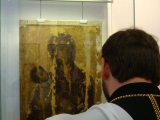 «Боже, почуй наш плач і поспіши нам на допомогу і порятунок!», – Глава УГКЦ у 156-й день війни
«Боже, почуй наш плач і поспіши нам на допомогу і порятунок!», – Глава УГКЦ у 156-й день війни
-
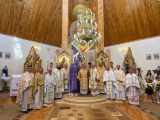 «Бог йому дав серце і душу українського народу»: відбулася щорічна проща до Прилбичів з нагоди уродин митрополита Андрея Шептицького
«Бог йому дав серце і душу українського народу»: відбулася щорічна проща до Прилбичів з нагоди уродин митрополита Андрея Шептицького
-
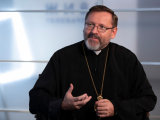 Глава УГКЦ: «Я горджуся українськими патріотами, які без найменшої краплі ненависті готові захищати своє»
Глава УГКЦ: «Я горджуся українськими патріотами, які без найменшої краплі ненависті готові захищати своє»
-
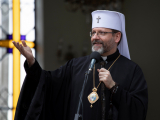 Блаженніший Святослав закликав українську молодь скласти присягу на вірність Христові
Блаженніший Святослав закликав українську молодь скласти присягу на вірність Христові
-
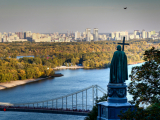 Глава УГКЦ у 155-й день війни: «Помолімося, щоб не втратити скарбу віри князя Володимира»
Глава УГКЦ у 155-й день війни: «Помолімося, щоб не втратити скарбу віри князя Володимира»
-
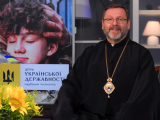 Блаженніший Святослав у День державності України: «Наша Держава – це для нас питання життя або смерті»
Блаженніший Святослав у День державності України: «Наша Держава – це для нас питання життя або смерті»
-
 Глава УГКЦ у 154-й день війни: «Нехай Господь Бог прийме у свої вічні обійми журналістів, які віддали за правду своє життя в Україні»
Глава УГКЦ у 154-й день війни: «Нехай Господь Бог прийме у свої вічні обійми журналістів, які віддали за правду своє життя в Україні»
-
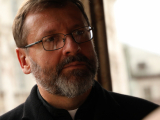 Глава УГКЦ у 153-й день війни: «Принесімо наш біль перед Боже обличчя і будьмо певні, що Він нас вислухає»
Глава УГКЦ у 153-й день війни: «Принесімо наш біль перед Боже обличчя і будьмо певні, що Він нас вислухає»
-
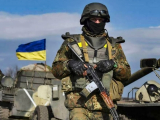 Глава УГКЦ у 152-й день війни: «Помолімся молитву заступництва за наших воїнів»
Глава УГКЦ у 152-й день війни: «Помолімся молитву заступництва за наших воїнів»
-
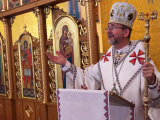 «Віруюча людина не може бути байдужою, коли бачить страждання іншої людини», – владика Богдан Дзюрах
«Віруюча людина не може бути байдужою, коли бачить страждання іншої людини», – владика Богдан Дзюрах
-
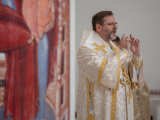 «Серед нашого страждання творімо простір для прояву Божої всемогутності», – Глава УГКЦ у 6-ту неділю після П’ятдесятниці
«Серед нашого страждання творімо простір для прояву Божої всемогутності», – Глава УГКЦ у 6-ту неділю після П’ятдесятниці
-
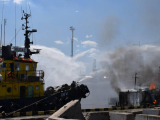 Глава УГКЦ у 151-й день війни: «Російське віроломство ми перемагаємо силою любові до нашої Батьківщини»
Глава УГКЦ у 151-й день війни: «Російське віроломство ми перемагаємо силою любові до нашої Батьківщини»

